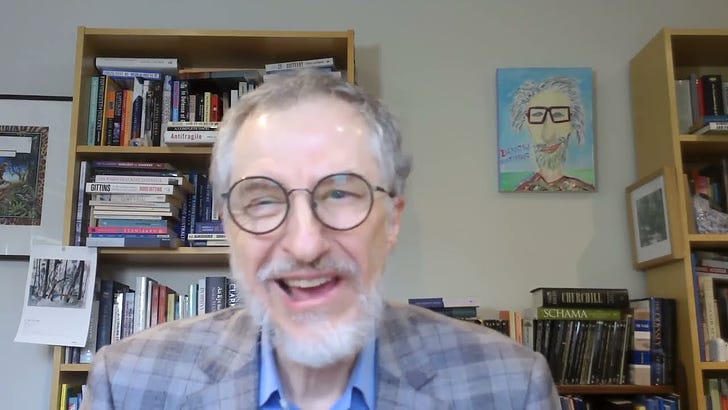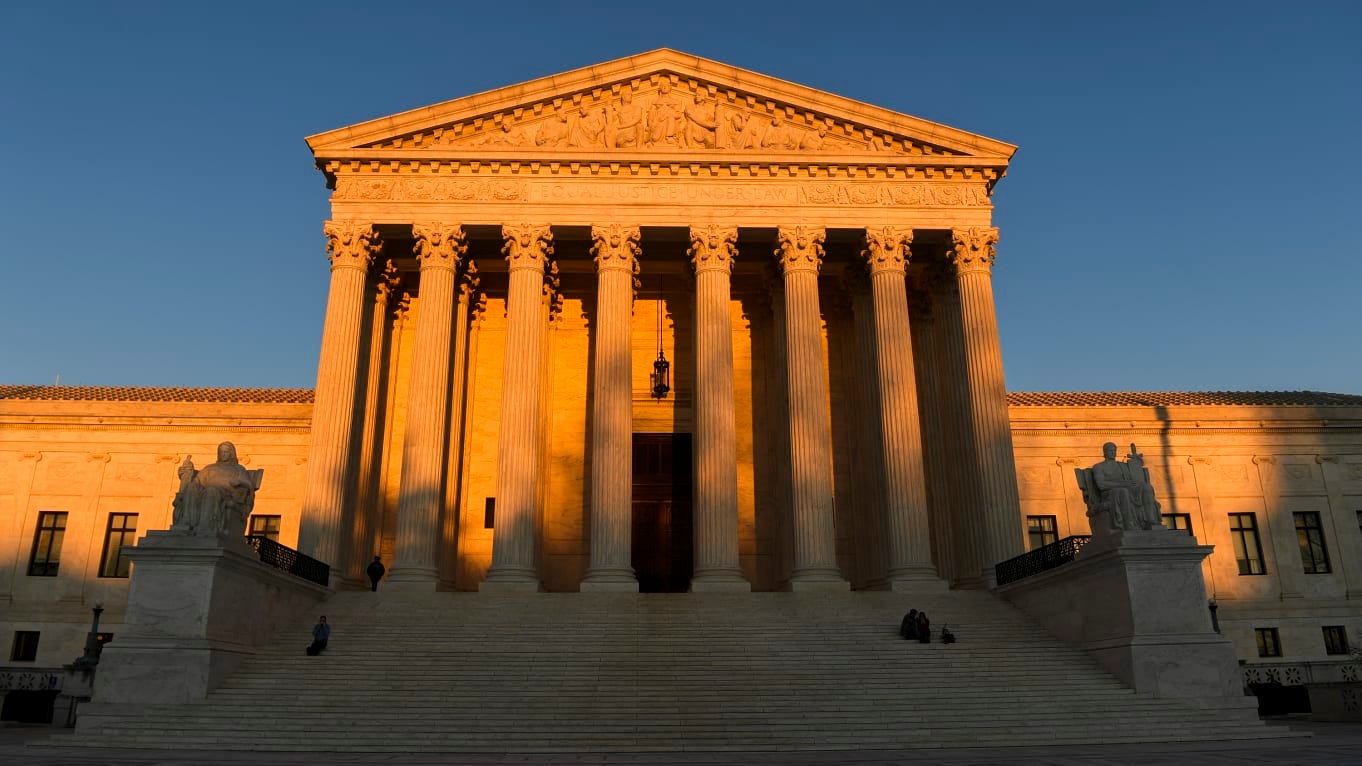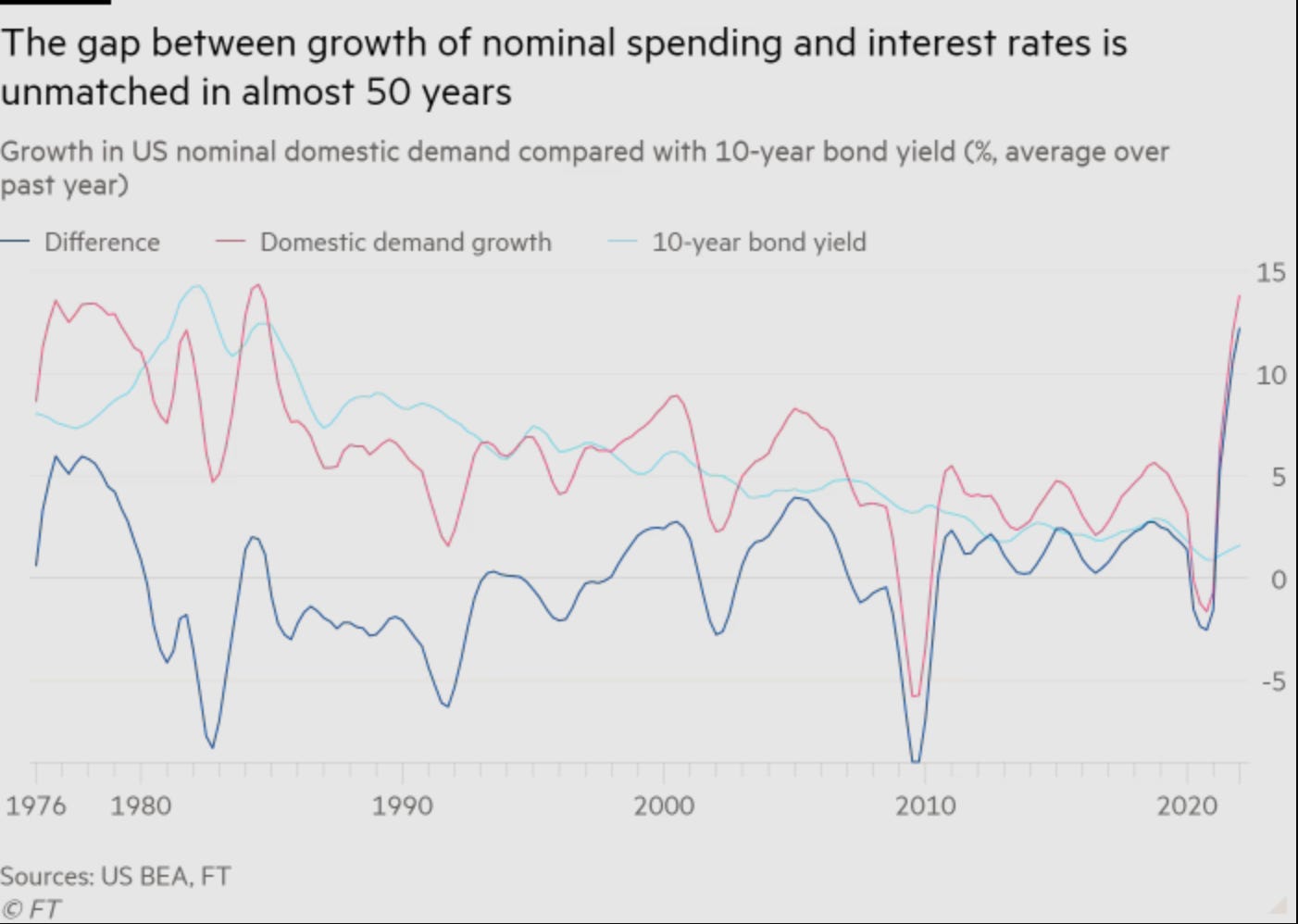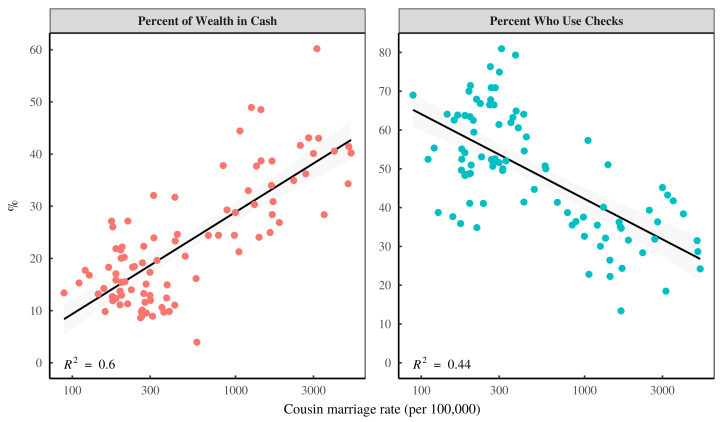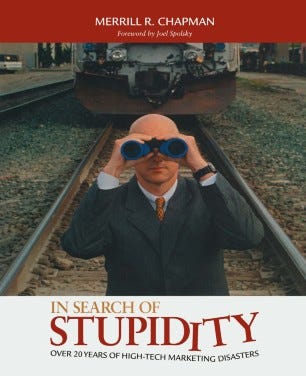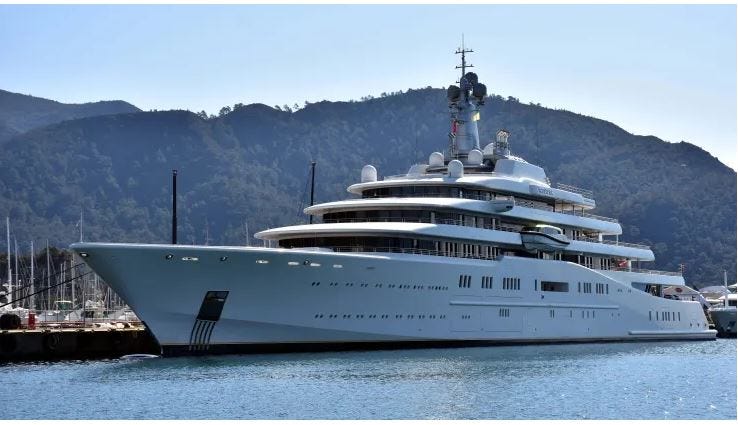Apologies for this re-sent newsletter. The one I initially sent out had the wrong heading on it (it was a date, but not content with a date for a heading, it was the wrong date). In case that confused people I’m just sending this note to clarify it — and the rest of the newsletter is attached as originally sent — so you if you have the original email in your in-tray, you don’t need to open it.
Change the government, change the country
I really enjoyed this conversation with my friend Peyton Bowman which celebrates the possibility that Australia might be able to show the world how to push back against the Trumpian madness.
We tried to turn Peyton's lack of inside knowledge of Australia's electoral system into a feature rather than a bug as I used the conversation to explain to him (and to myself!) the significance I saw in the recent election of a new Labor Government.
I think Australian culture and two specific features of our electoral system make it easier for our politicians to govern from the centre. Now the triumph of a number of independents from the wealthier, previously conservative voting suburbs of Australia’s big cities has swung the pendulum back towards the centre and opened up new opportunities, not just for the country, but for each of us.
And I explain my own plans for making a small contribution to a new and better Australia.
Meanwhile in France …
Reaction in the USA

‘It was vitriolic; it was nasty’: Holmes à Court on News Corp, the Coalition’s PR team
It was Holmes à Court, the 49-year-old one-time supporter of former treasurer Josh Frydenberg, who was singled out by the Murdoch machine. So what has the experience taught him about the state of Australian democracy?
“The whole Climate 200 is first and foremost a democracy project,” he says.
“I’ve heard people say this before but now I absolutely see how the Murdoch media is the PR arm of the Liberal Party. There were stories that were definitely fed to them by [Senator] Andrew Bragg and [MP] Jason Falinski that they would magnify with innuendo and bullshit. Then it would be printed and within seconds the MPs would tweet the articles out again and that would be turned into a derivative story on Sky, but stripped of any of the context that was mainly missing.
“I was just seeing this sort of machine where the party machine, including sitting MPs, were very much part of this News Corp machine. Not even a blurred line. No line”. He says assaults by News Corp outlets had an unintended consequence: there was a spike in donations to Climate 200.
News Corp aside, the Climate 200 model also befuddled a media that had trouble accepting the idea that independents could choose to emerge in an electorate rather than being placed there by a governing organisation.
David Shor and the North Shore

Another excellent piece by my Club Troppo stablemate, David Walker.
I’ve written about Shor before on Troppo. Here are two key tenets of his thinking:
Education explains more of the electoral movement happening now than does income or class.
Parties that keep attention on their most popular ideas will do better than those that talk about their least popular ideas.
I think these notions tell us something about Labor’s win.
I also put in my oar in an interesting comments thread.
David Marr lets himself go
David Marr writes compellingly. But I fear his fluency gets in the way of him understanding more about the world around him. This paragraph is quite the zinger:
Refashioning language so that elite and progressive and virtue become pejoratives takes time and money, but it can be done to stifle decent voices in the party. Then redefine progressive wealthy electorates as – gasp – inner city as if the rich streets of Bellevue Hill and Canterbury were old slums with dangerous politics.
But those turns in the language are important signs of the times, and developments in our culture, not to mention our economy, that he might be thinking about and helping his readers understand rather than just polishing up a few more soft-left talking points. Then there’s this piece of absurd hubris.
Had Labor been a true progressive party over the last half century, the power of the class divide might have disappeared long ago. As it is, a trace of snobbery among conservatives and the social caution of Labor kept the divide in place until ... the weekend.
Pahleese …
Fruitcake watch …
The Supreme Court Just Said That Evidence of Innocence Is Not Enough
The same court that appears poised to overturn Roe v. Wade in order to protect innocents before they are born seems to lose interest when it comes to innocents later in life.
Last December, the Supreme Court gathered to hear oral arguments in Shinn v. Ramirez, a case that could mean life or death for Barry Jones, who sits on death row in Arizona for the rape and murder of his girlfriend’s 4-year-old daughter, Rachel.
In 2018, a federal court overturned Jones’ conviction, concluding that he had failed to receive effective counsel, a violation of his Sixth Amendment rights. Had that happened, a federal judge ruled, “there is a reasonable probability that his jury would not have convicted him of any of the crimes with which he was charged and previously convicted.”
After losing in the 9th U.S. Circuit Court of Appeals, Arizona’s attorney general appealed the decision to the Supreme Court. During those oral arguments, state prosecutors repeatedly argued that “innocence isn’t enough” of a reason to throw out Jones’ conviction.
On Monday morning, by a 6-3 vote, the Supreme Court concurred: Barry Jones’ innocence is not enough to keep him off of death row. The state of Arizona can still kill Jones, even if there exists a preponderance of evidence that he committed no crime.
Why AI isn’t coming for us any time soon
They may be philosophers, but some of the effective altruism folks have a very ‘boys own’ idea of how the world works. As Eric Hoel argues in one of his many excellent essays, they haven’t taken on board the evolutionary forces from which intelligence emerged. In a nice turn of phrase, Hoel argues that their idea of ‘super-intelligence’ is deistic, not evolutionary.
The space of all problems is mostly stuff that human beings are really bad at, like picking out the same two color pixels on a TV screen (and three pixels triads, and so on). This scale or metric for intelligence fits perfectly with the deistic framework for intelligence, making it imaginable or at least definable that intelligence is a dial that can be turned up indefinitely.
In contrast, let’s now introduce the evolutionary framework. In this framework, intelligence is really about adapting to some niche portion of the massive state space of all possible problems. Its inspiration is On the Origin of Species, the closing of which I’ll quote in full because it’s such a wonderful paragraph:
Contemplate a tangled bank, clothed with many plants of many kinds, with birds singing on the bushes, with various insects flitting about, and with worms crawling through the damp earth, and to reflect that these elaborately constructed forms, so different from each other, and dependent upon each other in so complex a manner, have all been produced by laws acting around us. …
In the evolutionary framework different intelligences live together on a tangled bank. … This is pretty much the way our artificial intelligences live together right now. One AI to fly the plane, another AI to filter spam from email, and so on. The evolutionary framework of intelligence doesn’t really allow for a superintelligence.
Lin Onus’s son makes a film about his grandad
I’ve always been a huge fan of Lin Onus’s paintings, and discover from this article that his father Bill Onus was probably the first Indigenous film maker in the country. He seems like a remarkable fellow — according to a new film by Lin’s son, Tiriki Onus.
The film ‘Ablaze’ is in Australian cinemas from May 26, 2022.
Urbit: a Hundred-Man Metropolis
Necessity is the mother of invention. Pride is its father.
To simplify somewhat, Urbit is an attempt to build a network operating system on which interactions occur in such a way that the operative network data is not stored on a central database (giving huge power to its owner) but rather a database that is distributed among users and funded through crypto tokenisation. I’ve been gifted a planet by someone who knows about these things, in case you’re interested. But at this stage I’m too stupid to navigate it — as I’d have been too stupid to navigate the internet until its killer apps turned up — email and the world Wide Web!
Urbit is a computer constructed in the pursuit of divinity.
By "the pursuit of divinity," I mean the pursuit of the inevitable and omnipresent Truth upon which all real achievement depends.
This is to say, urbit is an attempt to build a computer which hews, in the long term, as close as possible to perfection.
The vanity is apparent. There are complications which seem more decorative than necessary, though I would argue that line is right to be blurred. The very language of urbit's construction is radically different from anything that came before. It's so radical, in fact, that probably half of the engineers who look into the project beyond the surface level scoff at it immediately.
Necessity is the mother of invention. Pride is its father.
Funny Tweet thread
Martin Wolf is a hawk on inflation
Relatively speaking anyway. Wolf continues to make up his own mind without regard for where that lands him on others’ imagined ideological spectrums. He’s been highly critical of neoliberal deregulation despite earlier being broadly supportive of it. But if your loadstar is how ‘tough’ someone is, he’s a hawk on inflation in the current circumstances. He makes a persuasive case:
The combination of fiscal and monetary policies implemented in 2020 and 2021 ignited an inflationary fire. The belief that these flames will go out with a modest move in interest rates and no rise in unemployment is far too optimistic. Suppose, then, that this grim perspective is correct. Then inflation will fall, but maybe only to 4 per cent or so. Higher inflation would become a new normal. The Fed would then need to act again or have to abandon its target, destabilising expectations and losing credibility. This would be a stagflation cycle — a result of the interaction of shocks with mistakes made by fiscal and monetary policymakers.
The political ramifications are disturbing, especially given a vast oversupply of crazy populists. Yet the policy conclusions are also clear. If the 1970s taught us anything, it is that the time to throttle an inflationary upsurge is at its beginning, when expectations are still on the policymakers’ side. The Fed has to reiterate that it is determined to bring the growth in demand down to rates consistent with US potential growth and the inflation target. Moreover, it is not enough just to say this. It must do it, too.
The darkening economic clouds remind me of a conversation my father overheard during the 1974 election. “Whoever wins should bags opposition!”
Krugman on inflation
Consumer inflation expectations now look a lot like those of 2008 and nothing at all like those of 1979 to ’80: The public now expects high inflation for the near term but a return to normal inflation after that. Financial markets, where you can extract implied inflation expectations from the spread between yields on bonds that are and aren’t indexed to consumer prices, are telling the same story: inflation today but not so much tomorrow.
In short, inflation doesn’t seem to be entrenched; 2022 isn’t 1980.
Nonetheless, I do expect to see some rise in unemployment. While we don’t seem to be in an inflationary spiral, many indicators suggest that the economy is currently running too hot to be consistent with price stability. Higher wages are good, but they seem to be rising at an unsustainable pace; unlike in 2008, inflation isn’t confined to a few areas, so that even measures that exclude the extremes are running high.
How Evangelicalism Lost Its Mind: David Brooks
This is David Brooks being interviewed by an evangelical of the non-crazy wing of the movement. I thought it was good. One reservation was that Brooks’ response to whether the US is setting itself up for a ‘civil war’ seemed too breezy to me. I think something a bit like the Irish ‘Troubles’ could easily start to ramp up in the US — a thought that popped into my head as I flew into Dublin for the wonderful Kilkenomics the day after Trump was elected president. There’s certainly a lot of ‘crazy’ in the States. But who knows? Brooks outs himself as an outrageous optimist, whereas I’m a worrier!
How Australia Saved Thousands of Lives While Covid Killed a Million Americans
The United States and Australia share similar demographics, but their pandemic death rates point to very different cultures of trust.
Another NYT correspondent falls in love with Oz. Not a great article, but worth realising some great things about our country (that are also under threat).
The true economic cost of Brexit is finally becoming clear
Two things are now clear. First, Britain is not enjoying the sort of post-pandemic trade boom seen in many countries. Second, our EU trade in particular has struggled to bounce back to pre-Covid levels. Looking at the final batch of data for 2021, Thomas Sampson of the London School of Economics judged that Brexit had finally “hit home,” and “reduced goods trade with the EU around 15 per cent” relative to trade with the wider world. …
So much for goods: what’s ultimately more important to an economy like ours is services. Comparing the latest official data to the position in 2018 (the last “ordinary” year before either Covid or panics about a no-deal Brexit), a new study from think tank UK in a Changing Europe finds that total service exports to Europe have dropped by 14 percentage points more than those to the rest of the world. There are bigger hits to two especially important categories: professional services (with an excess hit to EU sales of 52 percentage points) and financial services (where the same gap is 38 points).
Abraham Lincoln's Religion
A tweet thread I got involved in led to this enlightening site which stacks up with what I’ve read. Lincoln is my favourite politician of all time and favourite orator — as I wrote here, the only great speaker I know of who made humility central to his schtick. These qualities and his deism makes him the true heir to the founding fathers most of whom were deists. And, as I tweeted:
ust to drive home a point about human fallibility, perhaps we’d all have been better off avoiding the civil war somehow and letting slavery die the death it would have. Who knows?


Joseph Henrich’s ‘The WEIRDest People in the World’: a review
Well there’s an intriguing correlation — the more cousin marriage there is in a region of Italy, the more cash and the fewer cheques are used. And the amount of cousin marriage about also correlates with the length and depth of the local involvement of the Catholic Church. All this, you may know is in Joseph Heinrich’s The WEIRDest people in the world which Blair Fix reviews at considerable length. Heinrich’s argument is that the Catholic Church’s consistent anathematisation of incest undermined the ‘intensive kinship’ that ‘scaled’ family power and lay behind the power of monarchy and that, over time the taboo on incest gave rise to the characteristics of western culture.
Seven Varieties of Stupidity
I generally dislike articles with headings like this. Most of us are pretty stupid, so lauding it over others who are stupider seems a bit rich to me. But it is by Ian Little who’s a great writer. And it does begin with this:
“There are so many kinds of stupidity, and cleverness is one of the worst.”
Thomas Mann.
I didn’t actually read further, but ran into others experpting it and so have relented — and at least read this bit of it. The rest of it is probably good too!
Once a clever person has adopted a mistaken belief it is very hard to talk them out of it: ‘cognitively sophisticated’ people are if anything more susceptible to flawed thinking than average, because they are so skilled at bending reality to fit the model of it they have constructed. … People with the ability to speak brilliantly off-the-cuff are also likely to be very good at finding instant and persuasive justifications for whatever it suits them to believe at any point. The right words just magically appear, perfectly turned, glistening like truth. …
I am particularly wary of cleverness when applied to social and political questions, which can’t be solved with maths. In this I’ve been influenced by some clever thinkers. You can trace a fundamental divide in Western thought between those who believe that knowledge and rationality invariably make us smarter and those who warn they can also make us dumber. On one side, Aristotle, Descartes, Kant, Voltaire, Paine, Russell; on the other, Socrates, Montaigne, Burke, Nietzsche, Freud, Wittgenstein. The latter group includes thinkers who are, in their different ways are interested in the ways that human intelligence generates a unique kind of stupidity. These are my guys.
I don’t agree with where he’s put Aristotle who was good enough to anticipate one of modernity’s chief intellectual vices. “It is a mark of a trained mind never to expect more precision in the treatment of any subject than the nature of that subject permits”.
Speaking of stupidity: China’s lockdown
Here someone explains China’s lockdowns. I was none the wiser, but admired them for trying.
The EU after Ukraine
I made a note to read this, but didn’t end up having time. But you can if you’re interested.
With time, the de facto centralization and depoliticization of the Union’s political economy has inserted a hierarchical center-periphery dimension into the Union. The “rule of law” instituted as the rule of an all-powerful court; the formally rule-based but in practice increasingly discretionary economic policy of the politically independent European Central Bank; and the sanction-supported reeducation in European “values” have led the EU to increasingly resemble a liberal empire, in both an economic and cultural sense, the latter as legitimation for the former.
America, Europe and Aristotle’s four causes
I was drawn to this article by its mention of Aristotle’s idea of cause, but that’s just to get you in if you fancy yourself as high-brow and are browsing the London Review of Books. It’s really a brief survey of the good and bad America has done as he superpower of the last century.
European governments have been infantilised. Nato’s Supreme Allied Commander Europe has to be an American general. European governments distrust one another, but rather than work out their differences, they rely on the United States. … By virtue of its size, geographic position and economic power, Germany ought to play a leading role in mediating between East and West, in other words, between Russia and Western Europe, but, in good part because of the catastrophe of Nazism, has been reluctant to do so.
The possibilities for peace that the Soviet Union under Gorbachev offered to both Europe and the United States in 1989-90 were of a sort that comes along very rarely, not even once a century. Gorbachev spoke of ‘our common European home’. Under American leadership, however, the West’s response was to expand Nato, an anti-Russian alliance both in its origins and at present, and to impose shock therapy on the Russian economy. Russia, historically, has always contained both democratic and statist elements. America’s outsize role encouraged the statist side of its politics, which was by no means inevitably dominant. No one can really say how post-1989 Russia would have developed if it had not been treated with condescension and hostility, but those are the conditions that produced Putin.
Ukraine
The Imperfect Shape of Peace in Ukraine
As tempting as it is to demand full justice for Ukrainians, the era of glorious wars, overwhelming victories, and clear-cut defeats is over. Ukraine’s best hope for peace today is a mutually unsatisfactory, but ultimately tolerable, deal with Russia that includes fundamental reform of Europe’s security architecture.
The case against Mearsheimer
I published Mearsheimer’s argument that the West had asked for trouble from Russia at the outset of this war. Here’s the Economist’s response. For what it’s worth, I continue to fret that this is looking like the run-up to WWI with vast alliances that could bring on nuclear armageddon, when the alternative is, if the nukes start flying, that the fighting is contained to one or two countries. And yes, that means nuclear greater nuclear proliferation. It raises the risk of nuclear war, but only by lowering the risk of nuclear annihilation for pretty much everything.
The undertaking that matters is the one that Russia gave in 1994, when Ukraine surrendered the nuclear weapons based on its territory. Among other things, Russia pledged not to use economic or military coercion against its neighbour. Its violations of this promise in 2014, when it seized Crimea and part of the Donbas region, and again on February 24th this year have been flagrant.
In fact NATO has every right to expand, if that is what applicants desire. Under the Helsinki Final Act, signed in 1975, including by the Soviet Union, countries are free to choose their own alliances. Is it any surprise that former members of the Warsaw Pact, which had suffered so grievously under Soviet rule, should seek a haven? For many years public opinion in Finland and Sweden was against joining NATO. It shifted after the invasion of Ukraine in February. The right for sovereign countries to determine their own destinies is one of the many things at stake in the war.
Branko on the lessons and implications of seizing Russian oligarchs' assets
Putin has not yet started executing people around him, but he has shown that politically they do not matter at all. The conclusion that the future Russian oligarchs will draw is the same that the Politburo members did under Stalin: it is better to have a collective leadership where individual ambitions will be checked rather than to let one person take the full power.
Under Yeltsin when they did dictate government’s policy, the oligarchs preferred to fight each other, brought the country close to anarchy and even the civil war, and by doing so facilitated the rise of Putin who introduced some order. …
The comparison was made at the time with American “robber barons” who also often became rich by illicit means, but had the interest to fight for the safety of property once they became rich. The expectation was that the Russian billionaires would do the same.
These expectations were upended by billionaires’ finding a (seemingly) much better way to make their money safe: move it to the West. Most of them did so and it seemed an excellent decision—all the way to about six weeks ago. The new post-Putin billionaires will probably not forget that lesson: so we may expect them to favor a weak central government, that is, a true oligarchy, and to insist on the domestic rule of law—just because they will have no longer any place where to move their wealth.


The Crime Effect of Refugees
Mevlude Akbulut-Yuksel, Naci H. Mocan, Semih Tumen, and Belgi Turan
Abstract: We analyze the impact on crime of 3.7 million refugees who entered and stayed in Turkey as a result of the civil war in Syria. Using a novel administrative data source on the flow of offense records to prosecutors’ offices in 81 provinces of the country each year, and utilizing the staggered movement of refugees across provinces over time, we estimate instrumental variables models that address potential endogeneity of the number of refugees and their location, and find that an increase in the number of refugees leads to more crime. We estimate that the influx of refugees between 2012 and 2016 generated additional 75,000 to 150,000 crimes per year, although it is not possible to identify the distribution of these crimes between refugees and natives. Additional analyses reveal that low-educated native population has a separate, but smaller, effect on crime. We also highlight the pitfalls of employing incorrect empirical procedures and using poor proxies of criminal activity which produce the wrong inference about the refugee-crime relationship. Our results underline the need to quickly strengthen the social safety systems, to take actions to dampen the impact on the labor market, and to provide support to the criminal justice system in order to mitigate the repercussions of massive influx of individuals into a country, and to counter the social and political backlash that typically emerges in the wake of such large-scale population movements.
A depressing post if you want to publish a book
Self-help
All regular newsletters should have a self-help section. That’s not true but anyway … here’s a tip
Go to sleep holding a ball in each hand
As we begin to drift into sleep we pass through a brief period of insight and creativity called N1 (nonrapid-eye-movement sleep stage 1). … A recent study gave subjects maths problems to solve and found that that subjects spending 15 seconds in N1 in rests between tests tripled their chances of getting the problem out.
Many famous people have used this technique, including Alexander the Great (356-323BC); composer Wolfgang Amadeus Mozart (1756-1791), organic chemist August Kekule (1829-1896), inventor Thomas Edison (1847-1931), theoretical physicist Albert Einstein (1879-1955) and surrealist painter Salvador Dalí (1904-1989).
Thomas Edison, the American inventor of the light bulb, almost certainly used this technique to uncover new ideas and solutions. Edison thought sleep was a waste of time and said he never slept more than four hours a night. He used to nap frequently while holding a ball in each hand and, as he fell asleep, the balls would drop and wake him.
You’re welcome
Meanwhile …

Thinking is just a matter of bubbles — bubbles bubbling up everywhere!


